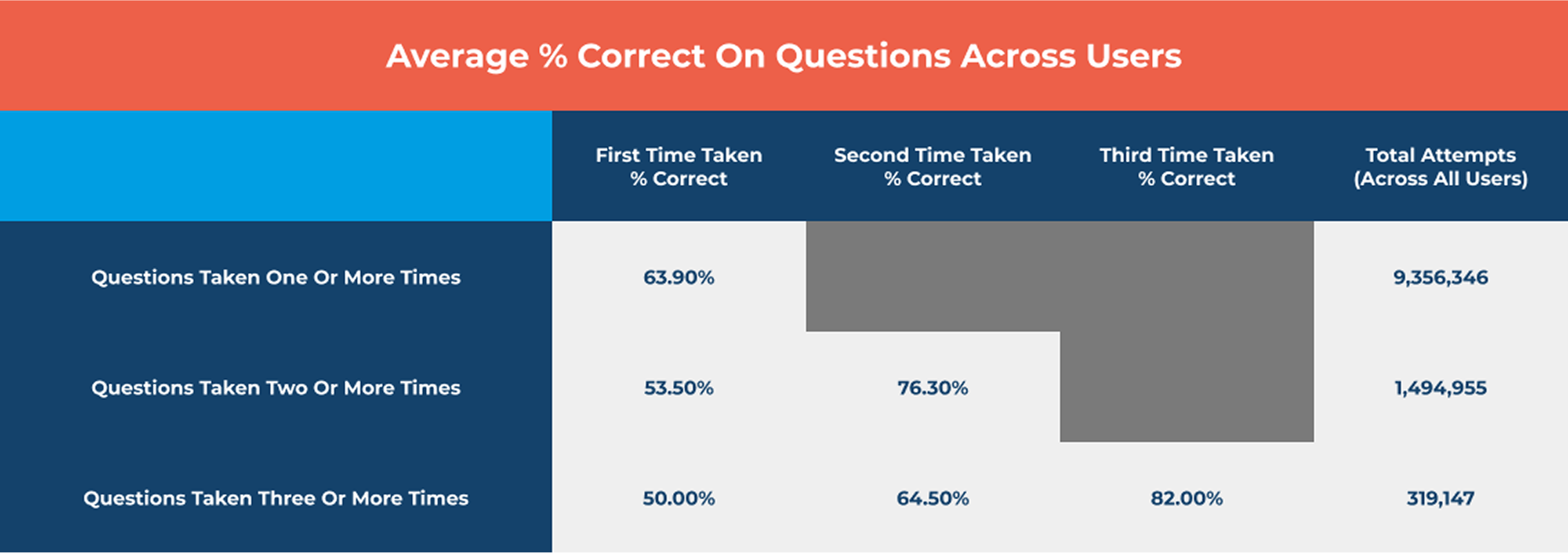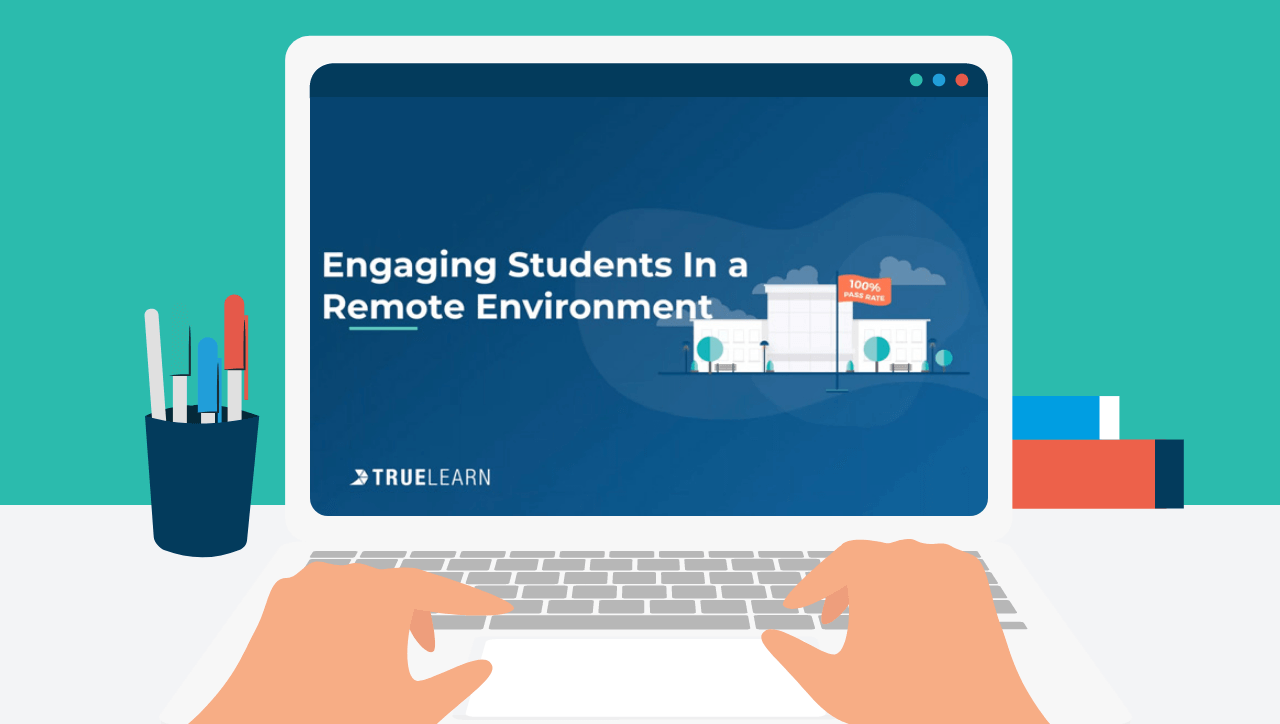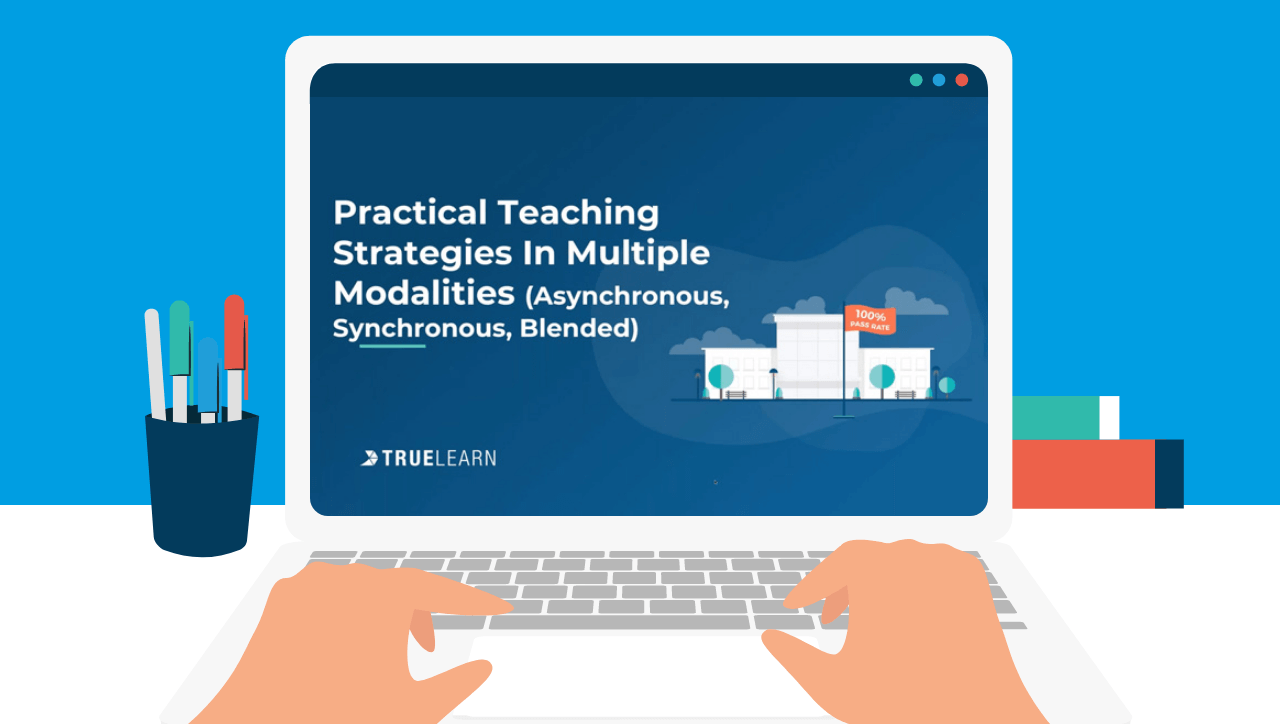Retaking Practice Questions is Key to Better Memory Retention in Healthcare Education

What if you could boost learners’ memory retention by up to 80 percent without adding more study hours and increasing stress?
Research on retrieval practice—the process of recalling information from memory—shows that students who revisit and retake practice questions retain up to 50% more material one week later compared to those who simply re-read their notes.1
More than a study tactic, practice questions are an evidence-based method for reinforcing learning through active recall. This process not only supports retention but also builds confidence and prepares learners for the clinical reasoning required in real-world practice.
But what happens after the first attempt? Is one pass-through a question enough, or can retaking add value?
Revisiting practice questions—even after answering them correctly—has been shown to strengthen memory, deepen understanding, and improve long-term retention.2
For educators, this opens a clear opportunity: by encouraging learners to retake questions strategically, you can help them engage more effectively and perform more confidently on exam day.
In this blog, we’ll break down:
- Why retaking questions works (with data to back it up)
- How it fits into evidence-based learning strategies
- Practical ways to apply it using tools like SmartBanks
The Cognitive Science Behind Taking Practice Tests
To understand why retaking practice questions is effective, it’s important to first look at two key cognitive science principles that explain how people learn and retain information over time.
The Testing Effect
The testing effect is a phenomenon that results in improved learning and memory retention from being tested on a subject versus simply reviewing material previously studied. A test forces the retrieval of information from memory, and research has shown that this results in better long-term retention than passive review. When learners recall material through questions or assessments, they strengthen their ability to retain and access that information over time.3
For healthcare learners, this has clear implications. The testing effect doesn’t just prepare them for exam formats—it actively builds the cognitive skills needed to apply knowledge under pressure, both in assessments and in clinical scenarios.
This process of active retrieval helps reconstruct memory, leading to deeper learning and stronger long-term retention. Unlike passively reviewing notes or textbooks, testing requires learners to search their memory and apply knowledge—an essential cognitive skill in both academic and clinical settings.
Retrieval Practice
Retrieval practice is the intentional act of recalling information to reinforce learning. Instead of rereading or reviewing content, learners are prompted to actively bring information to mind, which helps consolidate what they’ve learned.4
This strategy can be integrated through low-stakes methods like quizzes, flashcards, or repeated practice questions. Over time, retrieval practice helps learners reduce forgetting, retain key concepts longer, and become more aware of what they know—and what they still need to focus on. It also strengthens metacognitive awareness by helping learners better gauge what they’ve mastered and where they need to improve.
Practice questions, in particular, make retrieval practice actionable and measurable. By revisiting questions, even those previously answered correctly, learners can reveal hidden gaps in understanding and reinforce more robust knowledge.
Incorporating retrieval practice into learning creates what cognitive scientists refer to as “desirable difficulties”—productive challenges that, while requiring more effort upfront, lead to stronger and more durable memory traces.
Together, the testing effect and retrieval practice explain why retaking practice questions is an effective strategy to improve retention, build metacognitive skills, and drive exam readiness.
Now that we’ve unpacked the cognitive science behind taking practice tests, let’s get into how retaking tests can significantly boost information retention and how this strategy supports learning and long-term success in healthcare education.
8 Benefits of Retaking Practice Questions
Retaking practice questions isn’t just about repeating the same material. It’s a research-backed strategy that helps learners reinforce knowledge, uncover gaps, and strengthen their ability to apply what they’ve learned, especially in high-stakes healthcare education.
Retrieval Practice
| Benefits | Why and How |
|---|---|
| Actively recalling information—especially when spaced over time—supports stronger memory consolidation than a passive review. Retaking questions pushes learners to reconstruct knowledge, making it more durable and easier to access when it matters. |
| Practice questions can reveal what learners haven’t yet mastered, even if they answered correctly the first time. Retaking those same questions later often uncovers incomplete understanding and refocuses the study on the areas that need it most. |
|---|
| Each time a learner engages in retrieval, they reinforce memory traces and slow the rate of forgetting. Regular re-engagement with practice questions helps preserve key concepts over time, especially in content-heavy fields like medicine and health sciences. |
|---|
| Retaking questions reinforces foundational knowledge and helps learners apply it in new or unfamiliar contexts. This is essential for clinical reasoning, where flexible thinking is needed to adapt concepts to real-world situations. |
|---|
| Retaking helps learners assess their progress and recognize what they know versus what still needs work. This kind of self-awareness leads to more targeted, efficient studying and greater confidence heading into exams. |
|---|
| Retrieval doesn’t just reinforce what’s already been learned—it makes it easier to absorb related material later on. This scaffolding effect helps learners build deeper, more connected knowledge over time. |
|---|
| The act of retrieving information activates and reinforces the neural pathways associated with that content. With repeated practice, knowledge becomes more accessible, both in assessments and in clinical settings. |
|---|
| Retaking questions requires effort, especially when learners don’t remember the answer right away. But that effort strengthens learning. These productive challenges are known to promote lasting retention and better performance when it counts. |
|---|

Retaking practice questions has become an increasingly valuable strategy in healthcare education. It allows learners to reinforce knowledge, self-correct, and build confidence—especially when preparing for high-stakes licensure exams.
These benefits often come from learners reflecting on their initial performance, adjusting their study approach, and engaging more intentionally with the content the second time around. In a field where mastery is essential, retesting offers an opportunity for deeper understanding and better preparedness.
Even questions answered correctly on the first try can benefit from revisiting. Studies show that repeated retrieval of previously recalled information significantly enhances long-term retention—often more so than continued studying or no follow-up at all. Retaking those questions later helps reinforce comprehension, validate true understanding, and make knowledge more accessible under pressure.5
This is supported by performance data from TrueLearn’s Data Lab. In one analysis, learners who reattempted questions three or more times improved their scores by an average of 32 percentage points—from 50% to 82%. Even those who initially answered correctly had a 13.6% chance of getting the same question wrong on a later attempt, reinforcing the need to revisit and reinforce learning.

“Learners who reattempted questions three or more times improved their scores by an average of 32 percentage points—from 50% to 82%.”— TrueLearn Data Lab
Retaking practice questions becomes even more impactful when paired with strategies grounded in cognitive science. While retaking a test is a good way to retain information, combining this with structured review techniques—like spaced repetition and interleaving—can further support long-term retention and deeper understanding across healthcare education.
How to Help Learners Retain Information
Retaking a test is a good way to retain what learners have studied, but its impact is even greater when combined with research-backed strategies that strengthen memory and reinforce understanding.
Here are three evidence-informed techniques educators can integrate into their curriculum:
1. Incorporate Spaced Repetition into Teaching
Spaced repetition involves revisiting content at planned intervals over time rather than reviewing it repeatedly in one sitting. This technique works with the brain’s natural forgetting process, prompting learners to recall information just as it’s on the verge of being forgotten—strengthening memory and retention.
Educators can apply spaced repetition by intentionally building these intervals into quiz schedules and review assignments, helping learners reinforce key concepts consistently throughout the course. Including previously assigned practice questions, perhaps those that were most missed, with a quiz that contains new questions can also promote spaced learning.
2. Utilize Interleaving Across the Curriculum
Interleaving is the practice of alternating between related topics or question types during study or assessment, rather than focusing on one area at a time. By mixing practice questions from different systems or subject areas, learners are encouraged to compare and contrast concepts, apply knowledge flexibly, and avoid overreliance on rote memorization. In the context of practice questions, interleaving challenges learners to adapt their thinking across various scenarios, promoting deeper understanding and stronger clinical reasoning.
Educators can integrate interleaving by designing assessments that draw from multiple topics and by rotating question types within practice sets to foster cognitive agility.
3. Ensure Learners Receive Timely Feedback
Feedback is a crucial element of effective retrieval practice. Providing learners with corrective insight—explaining why an answer is correct or incorrect—reinforces accurate knowledge and addresses misunderstandings before they become ingrained. Whether given immediately after a question attempt or after a deliberate delay, timely feedback helps learners reflect on their reasoning and supports stronger retention of key information.
Within quizzes or tests, educators can prioritize feedback by offering detailed answer explanations, reviewing missed questions in class discussions, or using platforms that provide practice questions with built-in feedback for every answer choice.
When combined with cognitive strategies like spaced repetition, interleaving, and timely feedback, retaking practice questions becomes more than review—it becomes a deliberate, evidence-based approach to building long-term retention.
To support this, educators need proven tools that align content with curriculum goals and enable data-driven precision learning—backed by powerful analytics that surface actionable performance data to track progress, identify gaps, and improve outcomes.
Curricular Support Tool to Enhance Learning and Memory Retention
One such solution is designed to make this process seamless. By leveraging TrueLearn, programs can align content with existing curriculum and/or learning objectives, reinforce strategies grounded in cognitive science, and support learner progress through data-informed decisions.
TrueLearn maps its content directly to licensure exam blueprints and core curriculum frameworks, ensuring that every practice question, quiz, and mock assessment targets the competencies learners need to master. Educators can easily select questions by body system, discipline, domain, or exam blueprint or content outline, align assessments with instructional goals, and reinforce high-yield content that supports exam readiness.
A full suite of quizzing tools allows faculty to expose learners to mixed topics, encouraging interleaving, prompting them to make connections across subjects and apply knowledge flexibly in both exam settings and clinical practice. The data-driven precision learning tool for healthcare education also facilitates spaced review and repeated retrieval through personalized quizzes and performance-based recommendations. Learners can revisit material at optimal intervals—reinforcing knowledge and reducing forgetting. Additionally, each board-style practice question includes a detailed explanation of each answer choice to support deeper understanding and strengthen clinical reasoning skills.
Supported by a robust analytics engine, the platform captures real-time performance data and tracks learner progress throughout the curriculum. Educators gain access to actionable insights—from topic-level performance to broader trends—making it easier to identify at-risk learners, monitor improvement over time, and evaluate curricular effectiveness.
By bringing high-quality content and performance data together in one platform, this solution empowers educators to deliver targeted, personalized learning experiences—ultimately supporting stronger outcomes for learners and programs alike.
Explore an institutional partnership here.
References & Footnotes
1 Why use practice questions? Upenn.edu. Accessed April 17, 2025. https://weingartencenter.universitylife.upenn.edu/why-use-practice-questions/.
2 Roediger HL, Karpicke JD. Test-enhanced learning: taking memory tests improves long-term retention: Taking memory tests improves long-term retention. Psychol Sci. 2006;17(3):249-255. doi:10.1111/j.1467-9280.2006.01693.x.
3 Roediger HL 3rd, Karpicke JD. The power of testing memory: Basic research and implications for educational practice. Perspect Psychol Sci. 2006;1(3):181-210.
doi:10.1111/j.1745-6916.2006.00012.x.
4 The 6 benefits of Retrieval Practice: A visual guide. InnerDrive. January 17, 2022. Accessed April 17, 2025. https://www.innerdrive.co.uk/blog/visual-guide-retrieval-practice/.
5 Karpicke J, Roedigeriii H. Repeated retrieval during learning is the key to long-term retention☆. J Mem Lang. 2007;57(2):151-162. doi:10.1016/j.jml.2006.09.004xs.
![How Educators Can Recognize and Help Students with Trauma [Webinar]](https://truelearn.com/wp-content/uploads/2020/11/Educator-Webinar-How-Educators-Can-Recognize-and-Help-Students-with-Trauma.png)

